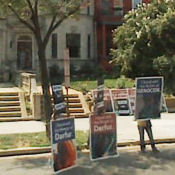
ABOVE: Google Street View of
Protesters at Sudanese Embassy
The Department of Treasury’s Office of Foreign Assets Control (“OFAC”) published today in the Federal Register a Final Rule amending the Sudanese Sanctions Regulations. The amendment permits U.S. persons to provide services in the United States to Sudanese embassies and diplomatic missions.
Today, OFAC is amending section 538.515 of the SSR. Before its amendment, section 538.515 authorized all transactions ordinarily incident to the importation of any goods or services into the United States destined for official or personal use by the diplomatic missions of the Government of Sudan to the United States and to international organizations located in the United States, subject to certain conditions. OFAC is amending this section to expand the scope of the authorization to include the provision of goods or services in the United States to the diplomatic missions of the Government of Sudan to the United States and the United Nations, and to the employees of the diplomatic missions of the Government of Sudan to the United States and the United Nations, subject to certain conditions.
To fully understand the impact of this amendment, you need to read section 538.406 of the Sudanese Sanctions Regulations which states that the prohibition on providing services to the Government of Sudan under section 538.206 applies when “such services are performed … [i]n the United States.” As a result, before today’s amendment, the provision of electricity, water, trash removal, Internet service to, or even selling office supplies to, the Sudanese Embassy in the United States would have required a license. How many people want to bet that these services were being provided without any licenses?
The lesson here is that although companies engaged in exports from the United States may have in place OFAC compliance procedures, those engaged in basically domestic businesses — like power companies and trash haulers — are often blissfully unaware that OFAC’s regulations may affect their domestic activities. In this instance, some vendor must have called the OFAC hotline and asked about selling things to the Sudanese Embassy, which led to an “oops” moment and a hasty amendment given that OFAC probably never intended to prevent the operation of the Sudanese Embassy on U.S. soil.
 Permalink
Permalink
Copyright © 2009 Clif Burns. All Rights Reserved.
(No republication, syndication or use permitted without my consent.)

 Posted by
Posted by  Category:
Category: 

